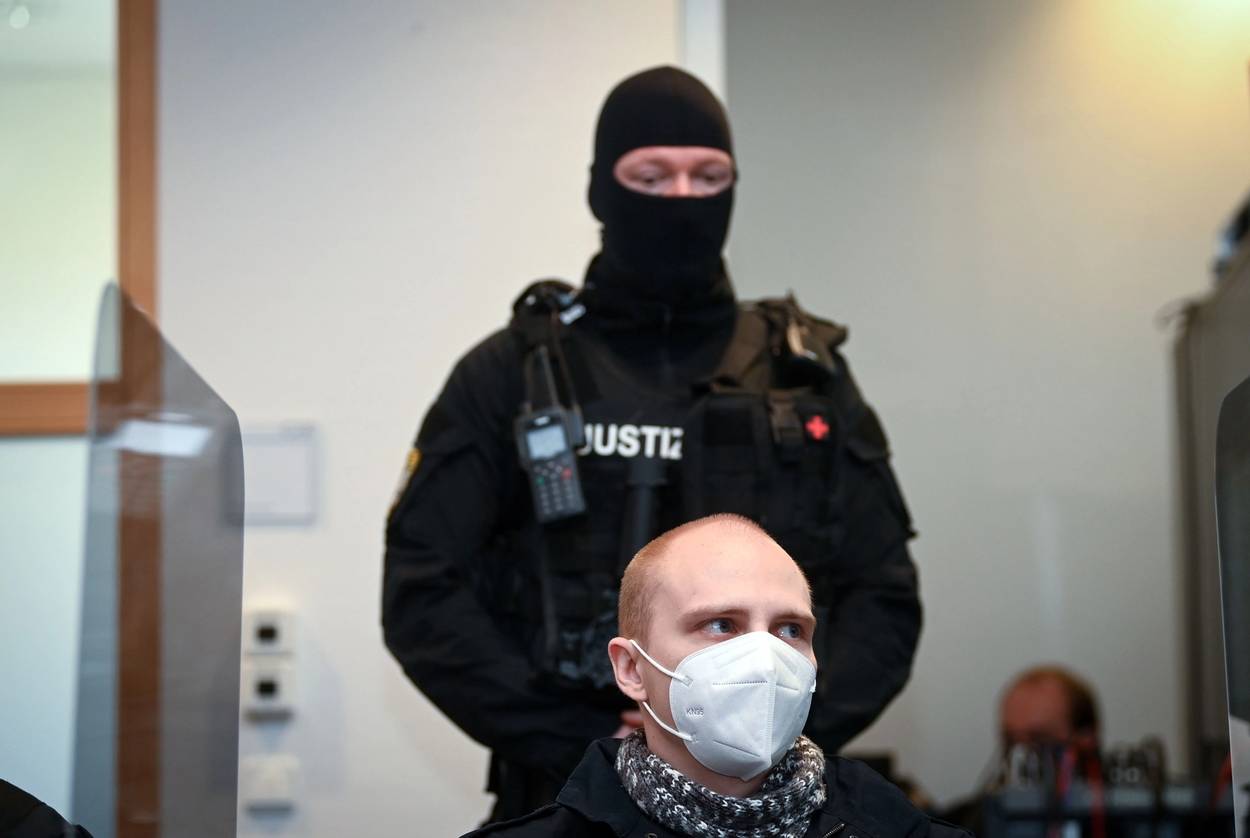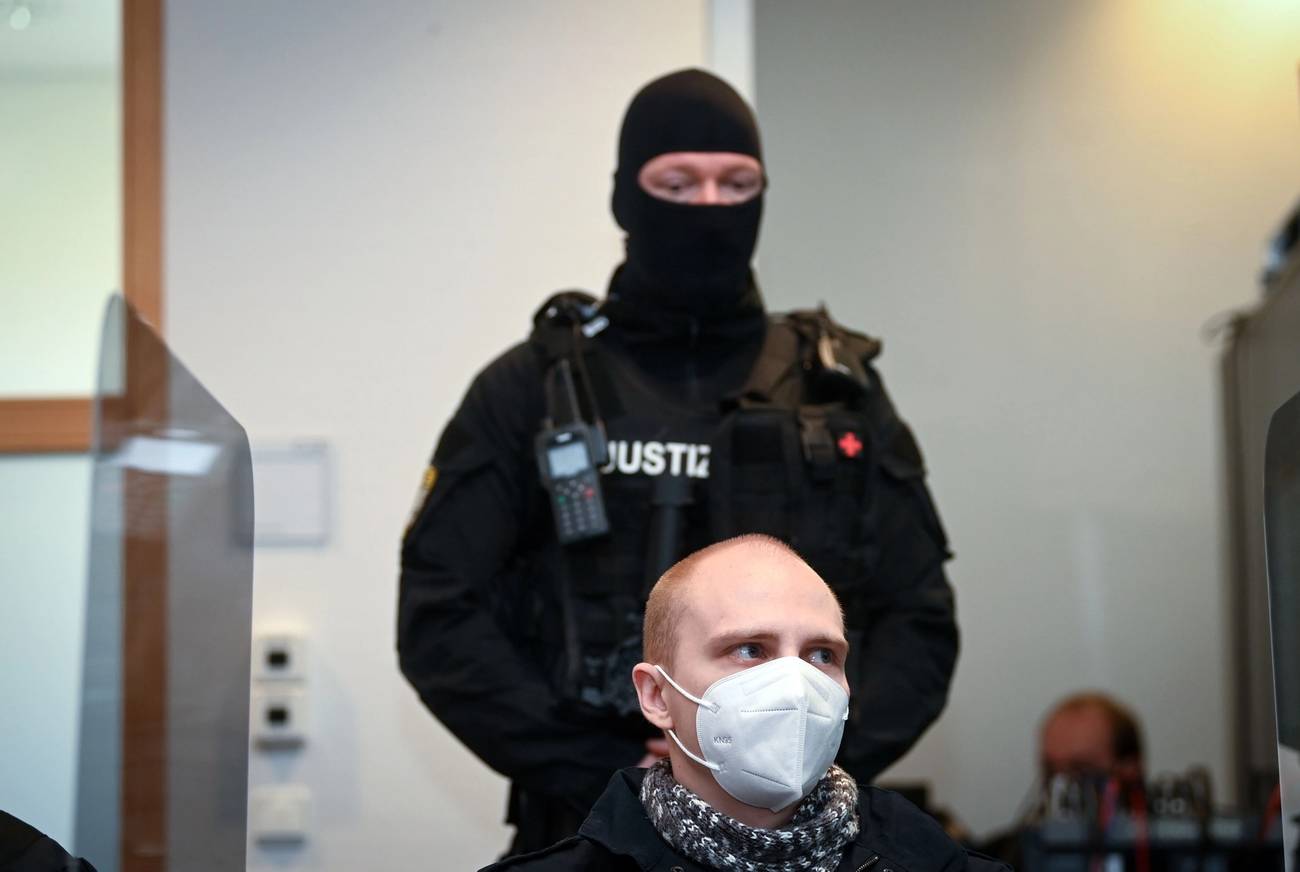Anti-Semitism Makes a Comeback in Germany
The threat is real, starting with right-wing paramilitaries and also including some Muslim bigots and their political enablers on the left. But the German state is determined to fight.




The Federal Republic of Germany, which arose out of the ashes and carnage of the Third Reich that perpetrated the Holocaust, has become an ardent proponent of tolerance and justice and a determined opponent of anti-Semitism, Islamophobia, and other forms of bigotry. At the same time, the ghosts of Germany’s chilling past have never disappeared entirely, as is evidenced by the resurgence of far-right extremism, neo-Nazi activities, and the targeting of Jews in schools and elsewhere.
Since the end of World War II, German political and moral leaders have for the most part unambiguously repudiated the hate-filled Hitlerian ideology that led to the genocide of millions of Jews during the Holocaust. They instead have steered their country toward democracy and reconciliation, including paying more than $80 billion in reparations to Jews for the unimaginable crimes committed against them by Nazi Germany. Germany has also emerged as a steadfast friend and ally of the State of Israel. Although much work still needs to be done to foster tolerance, these central facts must lie at the core of any assessment of the alarming rise in anti-Semitism on German soil.
In a recent report, “2020 Top Ten Worst Global Anti-Semitic Incidents,” however, the Simon Wiesenthal Center fails to recognize Germany’s progress in condemning and illegalizing anti-Semitism, and erroneously emphasizes the effort by a so-called “German Elite” to “re-legitimize” the virulently anti-Israel BDS movement. The elite in question is a consortium of German intellectual institutions and groups that deems a German parliamentary resolution condemning BDS to be antithetical to the right of free speech. The report singles out a senior German Foreign Ministry official and three left-wing members of parliament for their outspoken pro-BDS stance.
Yet BDS is hardly mainstream politics in Germany, even on the left. In May of 2019, the German parliament adopted a resolution, supported by all of Germany’s main political parties, that explicitly defined the BDS movement as anti-Semitic and called on German government bodies to refrain from funding or supporting any groups that question Israel’s right to exist.
Still, the need for such a measure in Germany is also abundantly clear. Anti-Semitism has returned to that country, and it does not emanate primarily from the left. As German Interior Minister Horst Seehofer has pointed out, “The biggest threat comes from the far right, we have to see that clearly.” Seehofer noted that more than 90% of anti-Semitic crimes in Germany, and a similar percentage of anti-Muslim hate crimes, were committed by right-wing extremists.
The German government recorded more than 2,000 anti-Semitic incidents for 2019, culminating in a Yom Kippur attack on the synagogue in the city of Halle, which a German federal prosecutor denounced as the country’s “most despicable act of anti-Semitism since World War II.” The German federal judicial authorities successfully prosecuted the perpetrator of the Halle attack, a German nationalist and Holocaust denier who killed two people in a rampage when he was unable to break down the door into the synagogue. In sentencing Stephan Balliet to life imprisonment, the presiding judge called the attacker’s unsuccessful attempt to kill the 51 Jews inside the synagogue “despicable, cowardly and inhuman.”
In June of this year, following an investigation into right-wing extremism within the ranks of the German military, federal Defense Minister Annegret Kram-Karrenbauer ordered the disbandment of an elite commando force unit, and the restructuring and reform of the remaining special forces.
The emergence of the ultranationalist, outspokenly anti-immigrant Alternative for Deutschland (AFD; Alternative for Germany) as a main political force on the far right of the German political spectrum is emblematic of a revitalized and reenergized xenophobia that has allowed long dormant anti-Semitic attitudes to resurface with a vengeance. AFD founder and parliamentary leader Alexander Gauland famously dismissed Hitler and the entire Nazi era, including by implication the Holocaust, as “just bird shit in more than 1,000 years of successful Germany history,” and described Nazi Germany’s May 8, 1945, surrender as a day of “absolute defeat” with an “ambivalent” legacy.
While the Halle shooter acted on his own, the AFD has been charged with facilitating and even encouraging the atmosphere in which anti-Semitism as well as anti-immigrant verbal and physical violence generally have become salonfähig, a German idiomatic term meaning socially acceptable. Dr. Josef Schuster, the president of the Central Council of Jews in Germany, has called the AFD “intellectual arsonists.”
Recognizing far-right anti-Semitism to be the most dangerous threat to Jews in Germany today is not meant to ignore or minimize its left-wing cousins. Anti-Israel attitudes, as personified by the BDS movement, often and easily morph into anti-Semitic rhetoric. In 2015, a survey conducted by the Friedrich Ebert Foundation found that legitimate criticism of Israeli policies often blurred into overtly anti-Semitic words and actions. In September 2019, two Palestinian rappers were banned at the last moment from performing at a pro-Palestinian rally in Berlin because of their glorification of terrorism and use of anti-Semitic symbolism.
At the same time, the dramatic influx into Germany of refugees from the war-torn Middle East, most of them Muslim, brought, in the words of German Chancellor Angela Merkel, “another form of anti-Semitism into the country.” This particular strain of Jew-hatred has manifested itself in schools where Jewish children have been repeatedly bullied and abused by students of Arab and Turkish descent. After one Jewish parent reported that his daughter had been told that she would be beaten and killed because she did not believe in Allah, Schuster told the Tagesspiegel newspaper that, “if Jewish students can no longer go to school without fear of anti-Semitic abuse, there’s something wrong in this country.”
Upon receiving the Theodor Herzl Award of the World Jewish Congress in Munich on Oct. 29, 2019, Chancellor Merkel expressed her alarm and deep concern at the increase in anti-Semitic offenses in Germany, including anti-Semitic statements on the internet. These developments, she declared,
are deeply troubling. They are directed against Jewish people in our country, but certainly not only against them because they are directed against all of us, against Jews, non-Jews, against everything that keeps and holds our country together, against our values and freedoms. They attack at the core, the very core, of our coexistence because they are an expression of an attitude that is deeply hostile against democracy … And it is all the most devastating when we have to acknowledge the promise of our state to protect the Jews in Germany is not always fulfilled, and that instead, for example, only a reinforced wooden door of a synagogue can protect the faithful gathered inside a house of God against a massacre.
Chancellor Merkel continued:
We must never accept a situation where in Germany people have to be afraid because of their faith, because of their religion, because of where they come from. We have to do everything we can to ensure that Jews in Germany can live in freedom and in security. Anti-Semitism, incidentally just as any form of racism, shows itself not in acts of violence first, but it appears much earlier and much more subtle ways; we must not only wake up once these words turn into deeds. We must act much earlier.
Addressing Chancellor Merkel on that occasion, WJC President Ronald Lauder declared that “I must tell you the painful truth. We cannot accept the marches we have seen lately in Chemnitz and Dortmund. We will not accept Nazi salutes in sports stadiums. Such demonstrations and such hooligans must be stopped and must be outlawed.” At the same time, Lauder commended the chancellor for her record of standing firm against extremism, hate, racism, and anti-Semitism.
Less than six weeks later, speaking at the site of the Nazi German death camp of Auschwitz-Birkenau on Dec. 6, 2019, Chancellor Merkel emphasized that,
we are experiencing worrying racism, increasing intolerance and a wave of hate crimes. We are experiencing an attack on the basic values of liberal democracy and dangerous historical revisionism in the service of group-specific misanthropy. Our focus is particularly on anti-Semitism, which threatens Jewish life in Germany, Europe and beyond. We must state all the more clearly that we do not tolerate anti-Semitism. Everyone should be able to feel safe and at home with us in Germany, in Europe. Auschwitz in particular admonishes and obliges each and every one of us to be vigilant on a daily basis, to preserve humanity and to protect the dignity of our neighbor.
Chancellor Merkel’s sentiments are consistent with those of other German leaders and the policies of the German government. “I am ashamed, and it pains me that anti-Semitism in Germany—especially here!—is showing its ugly face more often and openly,” German President Frank-Walter Steinmeier said in March 2019 at an interfaith gathering in Nuremberg, adding that he considers anti-Semitism to be “something like a red line in every democratic society. And this line is not negotiable.”
In 2018, the Office of Federal Government Commissioner for Jewish Life in Germany and the Fight against Anti-Semitism based at the federal Ministry of the Interior, Building and Community, was created, with Dr. Felix Klein appointed as the first holder of this position. Numerous German states have taken the critical step of appointing commissioners to combat anti-Semitism. In an end-of-year interview, Klein sounded the alarm at the increasing prevalence of anti-Semitic rhetoric in German schools, and called for strong and coordinated action to counter this trend. “It is alarming,” he said, “that the exclamation ‘You Jew’ as a swear word has found widespread use in German schoolyards, in particular in Muslim settings,” adding that “no one is born an anti-Semite.”
In response to the Halle attack, the German parliament has enacted a law to counter far-right extremism and hate crimes, which provides that an anti-Semitic motive for a crime will increase the severity of the resulting penalty. “Right-wing extremism is the greatest threat to our open and diverse society,” declared German Justice Minister Christine Lambrecht. “It is intolerable that racists and anti-Semites attack people in our country every day, online or on the street.”
Finally, it is misleading to discuss contemporary German anti-Semitism without acknowledging the widespread efforts by large segments of German civil society to affirmatively integrate Holocaust documentation, remembrance, and education into mainstream German political, cultural, and social consciousness. The Gedenkstätte (Memorial Site) of the former Nazi concentration camp of Bergen-Belsen, Berlin’s Memorial to the Murdered Jews of Europe, and the House of the Wannsee Conference, where the “Final Solution of the Jewish Question” was set in motion in January of 1942, are only three of many institutions throughout Germany where the Hitlerian genocide of European Jewry is made an inexorable part of the German identity.
There is no question that anti-Semitism, especially, but certainly not exclusively, emanating from the extreme right, remains a deeply troubling phenomenon in modern-day Germany. However, the commendable attitudes and actions of the German authorities in fighting this hatred must at least be referenced and acknowledged in any even-handed evaluation and understanding of the present day conditions experienced by and confronting the German Jewish community.
Menachem Z. Rosensaft teaches about the law of genocide at the law schools of Columbia and Cornell universities and is general counsel emeritus of the World Jewish Congress. He is the author of Poems Born in Bergen-Belsen.